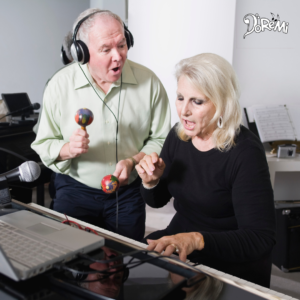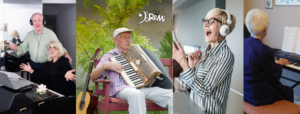If you think you’re too old to learn a musical instrument, think again! Although many people believe that childhood is the best time to learn music, retirement can also provide the ideal opportunity to enroll yourself in lessons. Not only do seniors have more time on their hands, but learning an instrument in your golden years can yield a variety of benefits. From enhancing your memory to boosting your mood, here are a few reasons why you should learn to play an instrument in retirement.
Music and memory

One of the most significant benefits of music for seniors is its seemingly magical ability to improve memory. According to John Hopkins, if you want to keep your brain engaged throughout the aging process, listening to and especially playing music is a great tool.
When you learn something new, the area of the brain that’s involved with memory and concentration is stimulated, and learning music is one of the best mental workouts available. For seniors who have age-related memory issues, music has the power not only to actually bring memories back, but can also slow age-related cognitive decline. Studies at Northwestern University on active music making with seniors ages 60-85, with no previous musical training, have shown that one 30-minute piano lesson followed by 3 hours of practice every week led to faster and sharper memories. This type of cognitively-challenging activity has been proven to have a positive effect on warding off dementia and Alzheimer’s disease.
Emotions and memory are very much linked, and because music is charged emotionally, it can trigger past memories. For those suffering from Alzheimer’s, the progression of the disease does not actually affect the brain’s natural response to music. Music increases the level of brain chemicals associated with good feelings, improved mood, reduced stress and reduced agitation (melatonin, serotonin, norepinephrine, epinephrine, prolactin). Since music has the ability to evoke memories, songs from childhood or early adulthood have been shown to have positive effects even on those in advanced stages of dementia.
Music reduces stress, anxiety & depression
Making music not on ly improves cognitive abilities, it can also be a form of stress relief.
ly improves cognitive abilities, it can also be a form of stress relief.
Listening to music that you enjoy can work wonders to calm you down and improve your mood. According to researchers, those effects are amplified when you’re the one responsible for creating those melodies. Sitting down with an instrument is a great way to deal with stress or anxiety, and some retirees even use music as a therapeutic tool.
According to the Music Making and Wellness Project, (a study designed to look at the quality of life as well as the physical and mental health benefits of active participation in music making for healthy individuals over age 65), playing music decreases anxiety, depression and perception of loneliness. Also significant in the study was that the blood tests of those taking lessons indicated a 90 percent increase during the test period in levels of Human Growth Hormone (hGH), which normally decreases at a rapid rate as we age. Higher hGH levels will increase energy and decrease the occurrence rate of illnesses related to aging.
Physical benefits
In addition to all of the wonderful health benefits that music has on the mind, it also has many positive effects on the body.
Actively making music provides a total brain workout. Along with reducing anxiety, heart rate and blood pressure, it can also decrease pain. Listening to or playing music can enhance productivity, improve sleep quality, enhance mental alertness, mood and memory. For seniors, these benefits are crucial.
Music making can also improve your hearing. According to researchers at Northwestern University, music training actually fine tunes the nervous system leading to sharper hearing and retention. They found that the musicians they studied, who were between 56 -65, had greater auditory memory and were able to hear speech in noisy environments better than their non-musician counterparts.
Singing is a great aerobic activity. It produces more oxygen in the blood, improves circulation and deep breathing, resulting in less stress and more “feel good” hormones. Singing as a group is even better … it can lead to friendship, happiness, uplifting and positive feelings, and reduced anxiety.
Dancing is also a very important activity for seniors. It improves aerobic capacity, mobility, agility, coordination and balance, and gives opportunities to socialize with others. The added bonus, a sharper brain and improved mood. For seniors, it’s important to find the motivation to move around, and studies have shown that music helps us exercise longer.
Social benefits
Life as a retiree can be challenging from a social perspective. Remaining socially active in our golden years has been linked to a number of health benefits.
Musical activities such as singing, dancing, and playing a musical instrument can broaden seniors’ social networks and reduce the risk of isolation and depression. Whether you invite your friends and family members to play with you, perform at community events, or learn an instrument with your grandchild, learning music is a great way to bond with those around you.
Quality of life
 The National institute on Aging recommends seniors learn something new, including playing an instrument, to achieve a more active lifestyle.
The National institute on Aging recommends seniors learn something new, including playing an instrument, to achieve a more active lifestyle.
Learning to play a musical instrument is a great way to focus on something new. It can even help alleviate some of the feelings of ennui that can set in once life becomes more relaxed. Such feelings of boredom aren’t as trivial as they may seem, and can lead to restlessness, depression, physical deterioration, and loneliness.
Music Education Research International has found that the quality of life for seniors is improved through music participation. They are able to increase self-understanding, achieve success as learners, participate in experiences that are rewarding and interesting, and express themselves creatively. Music making provides opportunities for personal growth and sometimes even leads to the fulfillment of life-long dreams.
What are You Waiting For?
While there are great benefits to listening to music, actively making music … actually making the sounds either by yourself or with a group … has been found to boost executive function, strengthen speech processing and hearing, improve memory and promote empathy. It can lead to reduced heart rate and blood pressure, reduced stress and anxiety, greater physical mobility and coordination, and even increased immune response. Making music can even slow the process of dementia and Alzheimer’s. Learning to play an instrument can provide a sense of purpose, accomplishment and personal growth.
It’s never to late to start making music! Pick up an instrument, sing a song, join a choir, dust off the piano, restring the guitar, participate and get involved … your heart, your brain, your body, your family and your friends will thank you for it!
At DoReMi, we have a lot of experience working with the “young at heart”. Why not contact us and get started today!

